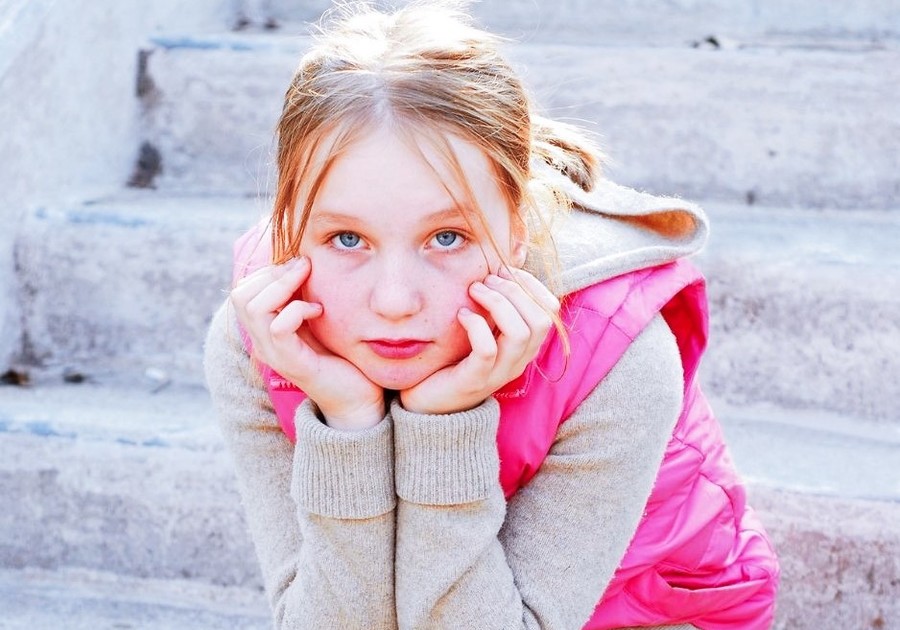There is no question that children are the future of our world. They grow up and become a part of society just as we are now. We can encourage children to be their very best selves, with no added pressure. We must nurture them, ensuring they grow into adults that can put love and hope into the world. As parents, it is our job to make sure our children have food, clothing, and shelter, but what about their mental well-being? What about their sweet little minds that are filled with anxious thoughts? Children with anxiety often feel alone, or their anxious thoughts are brushed off as being "normal". I encourage us all to nurture their anxious minds instead of letting them suffer in silence.
Some fear and worry are entirely normal for children; however, uncontrollable excessive worry about multiple events could mean they struggle with anxiety. Children who are experiencing uncontrollable fear and avoiding triggering events is one sign they may be suffering from anxiety. I always highly recommend consulting with a child psychologist or well-trained therapist to determine the best course of action.
Symptoms of Anxiety in children can look different than those in adults; it mostly looks like complaining and being fussy. The most common symptoms of anxiety are an upset stomach, headache, and fatigue. Avoidance and excessive fear are other symptoms that are easier to recognize. The thing with anxiety in children is they avoid anything that may cause them stress, which is a negative coping skill and could spill over into adulthood. Helping children learn new coping skills for dealing with stressful events and triggers will ensure they are set up for success in the future.
Before I delve into coping skills to help children, I want you to know that you're a good parent. There is nothing you have done wrong for your children to be experiencing anxiety. There is no one cause for why children may experience anxiousness. Exposure to a stressful event such as a death in the family, car accident, moving, or history of anxiety in the family could be or could not be a reason for the anxiousness. So, be easy on yourself. I know as parents, we often burden ourselves with the pain our children are going through. How could we not? But, just being here right now reading this means you're committed to helping your child be their best selves.
1. Drawing
Art is a form of expression, especially for younger children who have difficulty talking about their feelings. If you look at the pictures your children draw and see similarities in each of them, such as thunderstorms, this could be a sign it is worrying them. Drawing to calm anxious minds works well for any age. Even adults use drawing or coloring to help relax them. You could ask your child to draw a bad day and a good day picture to compare each photo. Doing so will get them talking about anything that may be causing the anxiety. Another way to use drawing is to allow them to free draw anything that comes to their mind. You can make it a family activity where everyone sits together, each sharing what you drew. Whichever way you decide to go about this one, drawing is sure to help kids get their feelings out and start processing their emotions.
2. Confront Avoidance
When children feel anxious about a particular event or place, they typically try to avoid it altogether. Instead of avoiding, encourage your child to confront their fears in a way that feels safe to them. Ensure your child is comfortable and not under pressure when they face their fears. Avoiding something makes children experience less of the world around them, creating a snowball effect of fear. Help your child take small manageable steps in confronting their triggers by reassuring them and using positive talk.
3. Reframing Negative Thoughts
Anxiousness can cause an enormous amount of "what if" thinking. Reframing negative thoughts into positive thoughts helps ease anxiety. Challenge the "what if" thinking as much as possible by asking, could that happen? how do you know? Use positive and encouraging talk towards your child when confronting their fears. Stay away from judgmental tones and saying, "there's nothing to be afraid of". What children are thinking creates the behavior they are displaying
4. Predict The Next Day
My son had panic attacks and anxiety related to the weather, the site of rain outside would cause him to spiral down into a rage of fear. One thing that has worked for him and suggests by a child psychologist is predicting the next day's weather. Predicting what will happen the next day works for any fear children may have. Sometimes, children with anxiety don't do well with the unknown, so using prediction is a great way to help them create positive thinking towards their fears. Right after getting your child into bed, ask them what they think tomorrow will be like? What good things do they think will happen? What are they most excited about?
5. Meditation or Deep Breathing
You may be thinking, what, kids will never sit still in silence! Instead of trying a traditional mediation, an option could be teaching breathing exercises. There are tons of different fun breathing exercises to help children regulate their breathing. There is an enormous amount of research on the benefits of mediation and how it helps reduce anxiety in people of all ages. You could also join your child in mediating or breathing exercises and make it a fun family activity. Some breathing exercises children will enjoy are:
- Blow out the candle
- Take five breathing
- Tummy breathing
- Pretzel breathing
- Bubble breathing
6. Movement
We hear this one all the time, get our children moving. Movement is a way to express yourself, whether it's through dancing, running, or walking. Dancing it out to their favorite song or going on a daily family walk helps reduce anxious thoughts. You can get creative with this one and genuinely do what works best for your child and your family. You can make this a family event, such as going for bike rides on Sundays or doing yoga together in the morning. You can tailor this to your child and his/her likes. Ask your child what they would have the most fun doing. You could also make a routine out of it. Maybe every Sunday, the whole family goes for a bike ride and then comes home and makes ice cream sundaes or orders some pizza!
Showing empathy towards your child's anxious behavior and allowing them to gain control over their fears by teaching new coping skills could definitely improve their lives. Anxiety does an excellent job of ruining anyone's life, especially a child's, by avoiding fun actives or continually worrying. Child psychologists suggest helping children change their thought patterns by reframing their negative thoughts to change their behavior. After all, we are what we think.
 | Amanda is the writer and creator of Birch and Lotus, a self-discovery blog, where she discusses mental health and becoming the best version of yourself. She is pursuing a degree in psychology with a concentration in childhood and adolescence. Amanda has two kids and is married to her husband who is serving active duty in the Army. She grew up on Long Island, NY, but has moved frequently due to her husband's career. As a military spouse, mental health advocate, and mother of two, she uses her personal experiences to help others overcome challenges and reach their full potential. |
Related articles:
 |  |  |
Macaroni Kid Lower Manhattan is the family fun go-to source for the latest and most comprehensive information in our area. Subscribe for FREE today.



